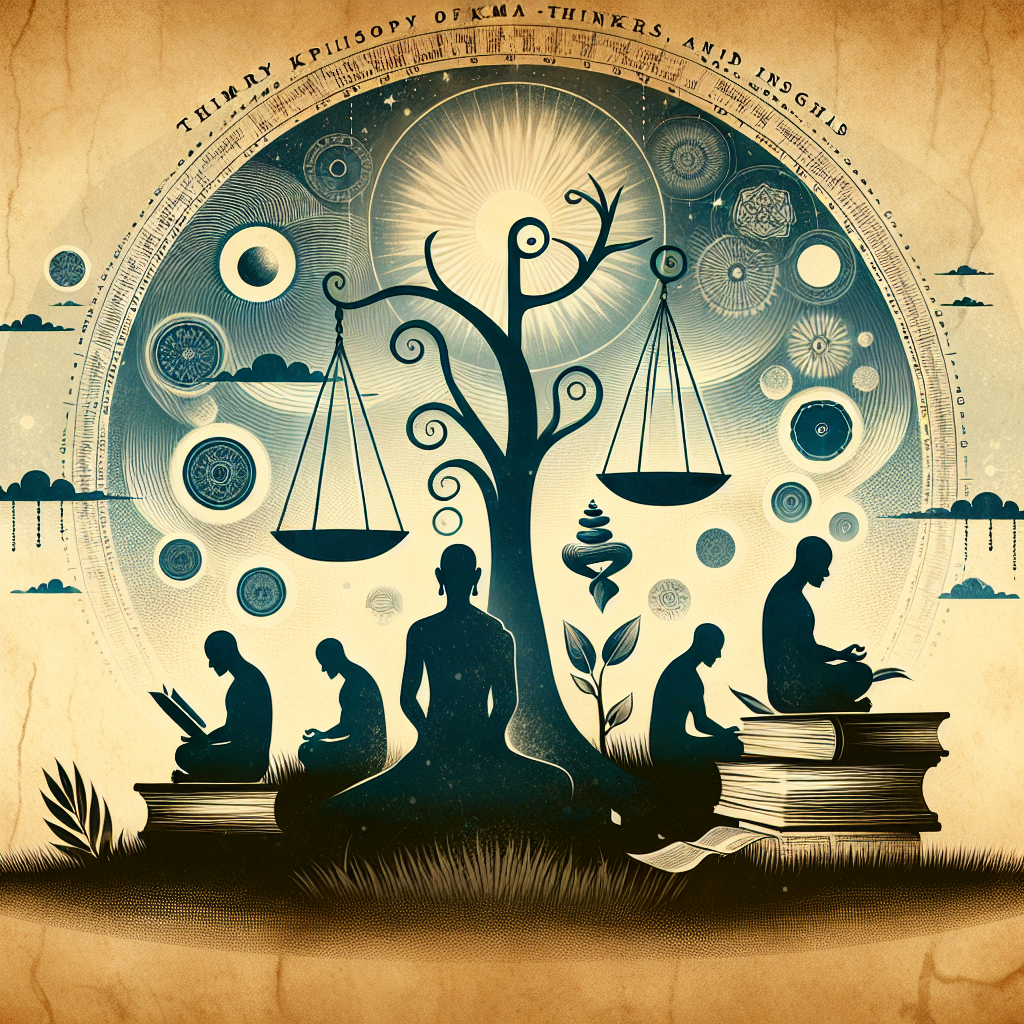The Philosophy of Karma: Thinkers and Their Insights
Introduction
The philosophy of karma, rooted in ancient Indian religions, primarily Hinduism, Buddhism, and Jainism, poses profound implications for ethics, moral agency, and the interplay between action and consequence. Karma, a Sanskrit term meaning "action," suggests that every action has a corresponding reaction, reinforcing a cyclical view of life and morality. Over centuries, a variety of thinkers and spiritual guides have provided insights into the nature of karma, enriching its understanding and application in various contexts.
This article will delve into the multifaceted philosophy of karma, exploring key thinkers, their insights, and the evolution of karmic thought over centuries. We will navigate through varying interpretations, implications for ethical behavior, and its relevance in contemporary society. By examining the diverse perspectives on karma, we hope to illuminate its complexities and inspire reflection on our own actions and their potential consequences.
The Origins of Karma
Karma’s roots can be traced back to the Vedas, the oldest sacred texts of Hinduism. In these early texts, karma is primarily associated with rituals and the moral order of the universe. The concept later evolved in the Upanishads, where it was linked with moral principles and the idea of rebirth. The basic tenet of karma is simple: moral actions lead to positive results, while immoral actions yield negative outcomes.
Early Thinkers
-
Patanjali:
Patanjali, the ancient sage credited with compiling the Yoga Sutras, offers critical insights into the workings of karma. He emphasizes the importance of intention behind actions, highlighting that the fulfillment of one’s purpose must align with universal dharma (moral law). For Patanjali, karma does not just concern physical actions but also includes mental and emotional states, advocating for mindfulness and clarity of purpose as vital components of ethical living. -
Buddha:
Siddhartha Gautama, known as the Buddha, expanded the understanding of karma significantly. In Buddhist philosophy, karma is perceived less as a deterministic force and more as a nuanced law of moral causation. Buddha taught that individuals hold the power to change their karma through conscious choices and intentions. His principle of "right action" within the Noble Eightfold Path further underscored the role of ethical behavior in creating positive karmic outcomes. - Mahavira:
In Jainism, Mahavira offered a unique interpretation of karma. He articulated that karmic particles attach to the soul based on one’s actions, leading to spiritual bondage. The Jain concept posits that liberation (moksha) can be attained by purifying one’s soul through non-violence (ahimsa), truthfulness, and self-discipline. Thus, Mahavira framed karma within a liberation paradigm, emphasizing the importance of ethical living as a tool for spiritual emancipation.
Evolving Philosophical Dimensions
As thoughts around karma evolved, several key ideas emerged that would influence various interpretations and practices across cultures and time.
The Moral Dimension
Philosophers like Adi Shankaracharya and Ramanuja engaged with karma’s moral implications through the lens of dharma—duty or righteousness.
-
Adi Shankaracharya: The influential philosopher emphasized the non-dual nature of reality, positing that ignorance leads to enslavement to karma. He argued that true knowledge (jnana) can free one from the cycles of action and its accompanying consequences. Karma, in his view, should be transcended through understanding one’s true self (Atman) as identical with Brahman (the ultimate reality).
- Ramanuja: In contrast, Ramanuja’s devotional philosophy suggested that sincere devotion (bhakti) to God could alleviate the burdens of karma. He proposed that while individuals are bound by their actions, divine grace plays a crucial role in liberating individuals from karmic entanglements.
Karma and Free Will
The interplay between karma and free will has been a contentious issue. Thinkers like Swami Vivekananda articulated perspectives that sought to harmonize these concepts.
- Swami Vivekananda: He asserted that individuals have agency and can shape their karma through conscious choices. Vivekananda’s teachings suggested that while past actions influence current circumstances, individuals have the power to change their future through positive actions in the present.
Karma in Popular Culture
In contemporary times, the understanding and portrayal of karma have permeated popular culture, often simplifying its complexities. Influenced by Eastern philosophies, the concept of karma is commonly invoked to denote a moral balance—good deeds leading to good outcomes and vice versa. However, this oversimplified view risks losing the deeper philosophical underpinnings and nuances that informed the original teachings.
Karma Beyond Religion
While karma originated within specific religious contexts, its concepts have found relevance in secular philosophical discussions and modern ethical frameworks.
Secular Interpretations
-
Philosophy of Action:
Contemporary philosophers explore how notions of karma could inform ethical theories. Actions defined by intention often lead to discussions on consequentialism, where the morality of an act is judged based on its outcomes. Karma’s emphasis on the significance of intent aligns closely with various modern ethical frameworks advocating for responsible moral agency. - Psychological Perspectives:
In psychology, the karmic view can be likened to concepts of personal responsibility and moral development. Modern psychological theories encourage self-awareness and ethical living, resonating with the teachings of karma that emphasize accountability for one’s actions.
Environmental and Social Justice
Karma’s implications extend to contemporary issues such as environmental sustainability and social justice. The intertwining relationship between action and consequence applies to systemic behaviors impacting the planet and society.
-
Environmental Ethics: The principle of karma encourages individuals and societies to consider the long-term effects of their actions on the environment. Ethical living rooted in awareness of karma may prompt collective efforts towards sustainable practices.
- Social Responsibility: Karma compels a moral responsibility towards others, emphasizing the significance of community welfare. A karmically-informed perspective could galvanize greater advocacy for social justice, recognizing that negatively impacting others inevitably returns to the self.
Conclusion
The philosophy of karma carries an expansive tapestry of insights across cultures and epochs. Through the writings and teachings of various thinkers, we’ve seen how karma transcends mere fate or punishment, revealing a nuanced understanding of moral agency, intention, and consequence. Whether grounded in spirituality or interpreted abstractly in secular thought, karma continues to inspire reflections on ethical living and the interconnectedness of our actions.
As we come to recognize the weight of our choices and their implications, we find ourselves engaging with the timeless philosophy of karma—a call to cultivate mindfulness, compassion, and responsibility in a complex world.
FAQs
-
What is karma?
Karma is a philosophical concept that refers to the principle of cause and effect, where an individual’s actions (good or bad) influence their future experiences. -
Is karma a religious concept?
While karma has its roots in Indian religions such as Hinduism, Buddhism, and Jainism, it has also been adapted into secular ethical frameworks and discussions. -
Do I have control over my karma?
Yes, many interpretations of karma suggest that individuals can influence their karmic outcomes through conscious choices and actions. -
How does karma relate to rebirth?
In various religious contexts, karma is tied to the cycle of rebirth (samsara), where the accumulated karma from past lives can affect the circumstances of the present life. -
Can bad karma be changed?
It is believed that by engaging in positive actions and cultivating good intentions, individuals can mitigate or transform negative karma over time. -
What role does intention play in karma?
Intention is a crucial factor in karma, as it shapes the ethics of an action. Two people performing the same act may generate different karmic consequences based on their respective intentions. -
Can karma apply on a societal level?
Yes, karma can extend to collective actions and behaviors, influencing broader societal outcomes based on the moral choices made by the group. - How can understanding karma impact one’s life?
Understanding karma can foster a sense of moral responsibility, encouraging individuals to act thoughtfully and compassionately toward themselves and others, ultimately promoting a more ethical and harmonious existence.
the-philosophy-of-karma-thinkers-and-their-insights





